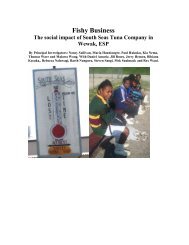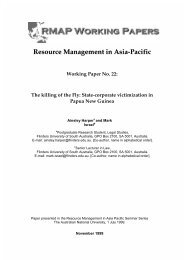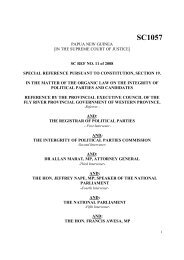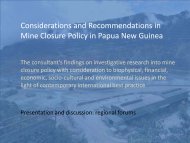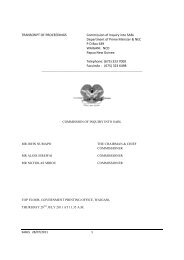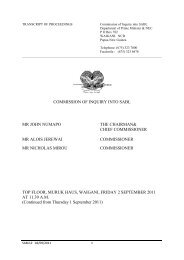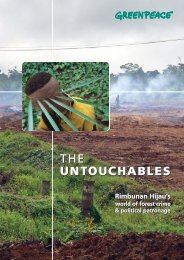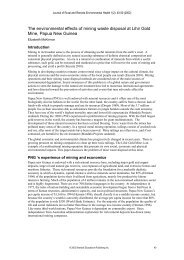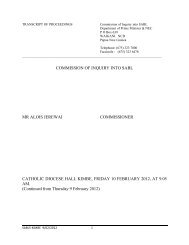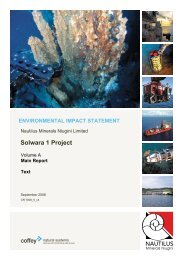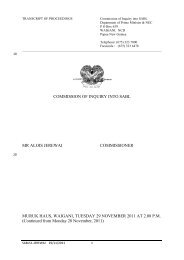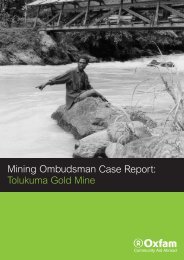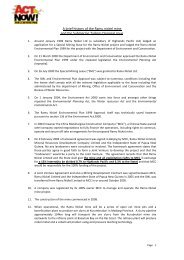Oxfam Australia and CAER: The right to decide
Oxfam Australia and CAER: The right to decide
Oxfam Australia and CAER: The right to decide
You also want an ePaper? Increase the reach of your titles
YUMPU automatically turns print PDFs into web optimized ePapers that Google loves.
Reconciliation Action Plans<br />
Some <strong>Australia</strong>n companies have developed a<br />
Reconciliation Action Plan (RAP). <strong>The</strong>se plans<br />
document what the company would do <strong>to</strong> contribute<br />
<strong>to</strong> reconciliation in <strong>Australia</strong>. <strong>The</strong>y “outline practical<br />
actions the organisation will take <strong>to</strong> build strong<br />
relationships <strong>and</strong> enhanced respect between<br />
Aboriginal <strong>and</strong> Torres Strait Isl<strong>and</strong>er Peoples <strong>and</strong> other<br />
<strong>Australia</strong>ns. A RAP also sets out the organisation’s<br />
aspirational plans <strong>to</strong> drive greater equality by pursuing<br />
sustainable opportunities”. 26<br />
An assessment of companies’ publicly stated<br />
commitments indicates that of the extractive industry<br />
companies among the <strong>to</strong>p 200 companies listed on<br />
the <strong>Australia</strong>n Securities Exchange (ASX) only BHP<br />
Billi<strong>to</strong>n, Rio Tin<strong>to</strong> <strong>and</strong> Woodside Petroleum have RAPs.<br />
A RAP could be used by companies <strong>to</strong> outline how they<br />
respect <strong>and</strong> implement FPIC in <strong>Australia</strong> <strong>and</strong> may act as<br />
a useful starting point for implementing this st<strong>and</strong>ard<br />
across all of a company’s operations.<br />
Further, on numerous occasions, mining company<br />
representatives have said <strong>to</strong> <strong>Oxfam</strong> that while they respect<br />
human <strong>right</strong>s they do not support FPIC thus erroneously<br />
disconnecting indigenous peoples’ <strong>right</strong> <strong>to</strong> FPIC from other<br />
human <strong>right</strong>s.<br />
<strong>The</strong> <strong>right</strong> <strong>to</strong> FPIC is explicitly recognised in some national<br />
<strong>and</strong> state laws including in the Northern Terri<strong>to</strong>ry of <strong>Australia</strong>.<br />
Many <strong>Australia</strong>n mining companies would be familiar with<br />
these legislative requirements <strong>and</strong>, if they operate in the<br />
Northern Terri<strong>to</strong>ry, would comply with these requirements.<br />
In fact, there is much that companies can learn from existing<br />
legislation <strong>and</strong> associated practice in the Northern Terri<strong>to</strong>ry<br />
that they could implement (with adjustments as required) in<br />
their operations in other countries.<br />
<strong>Oxfam</strong> <strong>Australia</strong>’s report on FPIC in <strong>Australia</strong> 27 describes<br />
some of these lessons. Yet many mining companies<br />
do not go beyond compliance with national law once<br />
outside of <strong>Australia</strong> — even when operating in countries<br />
where indigenous peoples <strong>right</strong>s’ are poorly protected<br />
<strong>and</strong> the specific <strong>right</strong> <strong>to</strong> FPIC is not recognised by law.<br />
<strong>The</strong> corporate responsibility <strong>to</strong> respect human <strong>right</strong>s requires<br />
companies <strong>to</strong> go beyond compliance with national law.<br />
It requires them, as a minimum, <strong>to</strong> do no harm, <strong>and</strong> respect<br />
international st<strong>and</strong>ards.<br />
FPIC is both a <strong>right</strong> in itself <strong>and</strong> can also help protect<br />
other human <strong>right</strong>s including <strong>right</strong>s <strong>to</strong> property, culture,<br />
religion, livelihood, health <strong>and</strong> physical wellbeing. It must be<br />
recognised that mining has the potential <strong>to</strong> negatively impact<br />
these <strong>right</strong>s including, for example, when communities are<br />
forced <strong>to</strong> resettle <strong>to</strong> allow for the development of a mine.<br />
<strong>The</strong> Special Rapporteur on the <strong>right</strong>s of indigenous peoples<br />
has said that consent (<strong>and</strong> consultation) constitutes a<br />
special st<strong>and</strong>ard that safeguards <strong>and</strong> functions as a means<br />
for the exercise of indigenous peoples’ substantive <strong>right</strong>s. 28<br />
Other safeguards include human <strong>right</strong>s <strong>and</strong> gender impact<br />
assessments, plans <strong>to</strong> mitigate the potential negative<br />
impacts on indigenous peoples’ <strong>right</strong>s, fair benefit-sharing<br />
<strong>and</strong> compensation agreements, <strong>and</strong> <strong>right</strong>s-compatible<br />
grievance mechanisms.<br />
<strong>The</strong> many accusations of human <strong>right</strong>s abuse directed at<br />
the mining industry — <strong>and</strong> strong opposition <strong>to</strong> many mining<br />
projects — would not be nearly so high if mining projects are<br />
only developed when the consent of indigenous peoples is<br />
obtained. Companies need <strong>to</strong> underst<strong>and</strong> the potential legal,<br />
reputational <strong>and</strong> financial risks of attempting <strong>to</strong> operate<br />
without this consent. Genuine respect for the requirement<br />
for FPIC of indigenous peoples would undoubtedly have a<br />
transformative effect on the industry <strong>and</strong> its relationship<br />
with indigenous peoples.<br />
<strong>The</strong> next section of this report examines the publicly stated<br />
positions of <strong>Australia</strong>n mining, oil <strong>and</strong> gas companies in<br />
relation <strong>to</strong> indigenous peoples <strong>right</strong> <strong>to</strong> FPIC.<br />
26. www.reconciliation.org.au/home/reconciliation-action-plans<br />
27. Mark Rumler, Free, prior <strong>and</strong> informed consent: A review of free, prior <strong>and</strong> informed consent in <strong>Australia</strong>, <strong>Oxfam</strong> <strong>Australia</strong>, December 2011.<br />
28. Report of the Special Rapporteur on the <strong>right</strong>s of indigenous peoples, James Anaya, A/HRC/21/47, 6 June 2012.<br />
9



